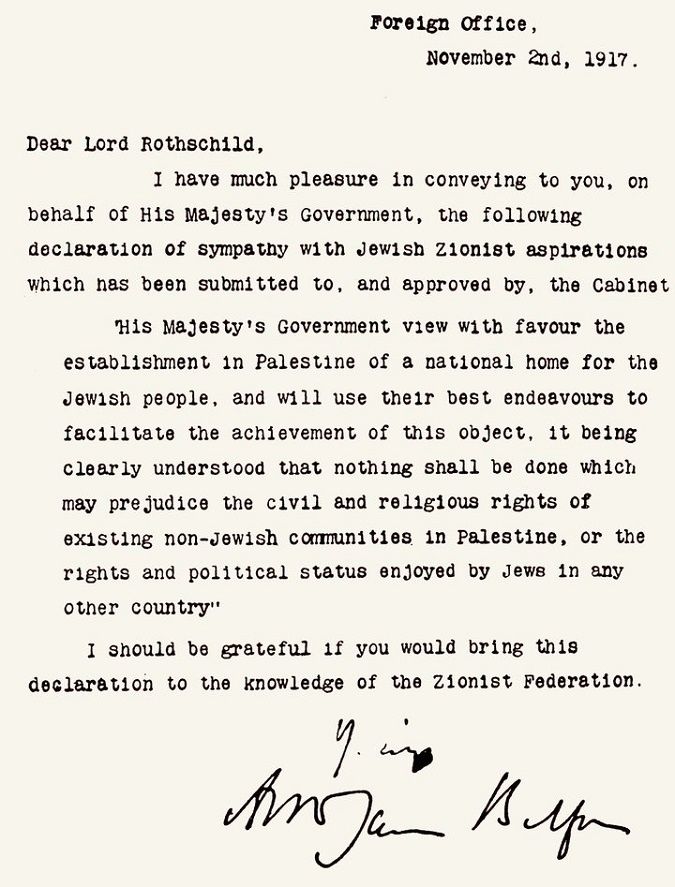As British Prime Minister Theresa May welcomes Israel’s head of state to celebrate the U.K.’s Balfour Declaration issued a hundred years ago on Nov. 2, 1917, Palestinians throughout the world are protesting the statement, which they see as setting the foundation for the Nakba, or ethnic cleansing, of Palestine in 1948, that led to the founding of the state of Israel.
RELATED:
16M Communist Farmers in India Join Israel Boycott Movement to Support Palestine
The letter – sent to zionist leader Lord Walter Rothschild by Foreign Secretary Arthur Balfour – was the first public statement by any major power giving support to the establishment of a "national home for the Jewish people” in Palestine.
"His Majesty's government view with favour the establishment in Palestine of a national home for the Jewish people, and will use their best endeavours to facilitate the achievement of this object,” the letter read.
The zionist movement had gained some traction in the U.K., but had failed to gain a foothold in any part of the world, as it sought to establish a Jewish state, contemplating African lands before settling on Palestine, which one leader described as “a land without a people ... for a people without a land.”
The Third Palestinian Congress of 1920 denounced the British government's support of the zionist plan, rejecting the mandate as a violation of Indigenous rights and international law.
Edward Said, a Palestinian academic would later describe the move as being "made by a European power … about a non-European territory … in flat disregard of both the presence and wishes of the native majority residents in that territory."
WATCH: Global Empire - Palestinian Blues
The League of Nations legitimized the Balfour Declaration in 1920 when it issued a mandate which ignored the contradiction of a “national home” for the Jewish people – a concept that did not and does not exist in international law – in a region populated by 90 percent Arabs.
The declaration became part of the British Mandate for Palestine after the defeat of the Ottoman Empire by the Allied forces in World War I, effectively turning over most of the lands occupied by the losing side to the winners.
The spoils of war consolidated new colonial powers in the Middle East, with the British leading the way, facilitating the immigration of European Jews to Palestine.
By 1935, the Jewish population grew from 10 percent to 27 percent of the total population.
RELATED:
New Report Reveals Damning Details of Palestinian Minors Held in Israeli Detention
The British government, who was historically anti-Semitic, used the zionist movement to resolve what it called the “Jewish problem,” encouraging Jewish people to leave Europe, where they were ruthlessly persecuted.
More importantly, the British empire was looking to protect its interests in the region, including raw materials and the Suez Canal, with its access to trade with the East.
“It would be a blow to England if either of her rivals should get hold of Syria. She must preserve Syria for herself,” Lord Shaftesbury, a British politician, said as early as 1876.
Zionist leader Zeev Jabotinsky made it perfectly clear, “If you wish to colonize a land in which another people are already living, you must provide a garrison or find a benefactor to maintain the garrison on your behalf,” adding that the zionist colony would “expand the British empire even further than intended by the British themselves.”

In the Hussein-McMahon Correspondence of 1915, the U.K. had promised the Arabs independence from the Ottoman Empire, but with the new British Mandate, Palestine became a British colony until 1947 when the U.K. transferred the question of Palestine to the newly-formed United Nations.
Thus, the second part of Balfour’s letter, where he promised that “nothing shall be done which may prejudice the civil and religious rights of existing non-Jewish communities in Palestine, or the rights and political status enjoyed by Jews in any other country," was never realized.
RELATED:
Palestinians, Journalists Condemn Israeli Raids on Palestinian Media Outlets
In the 30 years of occupation, with the approval of the United States and France, the U.K. trained, armed and financed the zionist takeover of Palestine, which culminated with the expulsion of over 750,000 Palestinians from their homeland, to make way for the state of Israel in 1948.
It built up zionist self-governing institutions while denying that right to the Palestinians.
It used collective punishment, demolitions, and emergency laws against the resisting Palestinian people, tactics that were quickly adopted by the Israeli state.
"Anyone who looks at the methods the British used in Palestine during the 1930s will see strong parallels with what Israel is doing today," David Cronin, author of “Balfour's Shadow,” said.
Balfour, as well as colonial secretary Winston Churchill, both later admitted that from the beginning, it was clear that a “national home” meant a Jewish state.